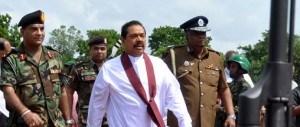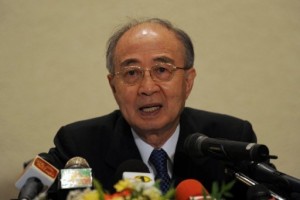Time for Sri Lanka to keep its promises in return for Int’l help with war
There is a hope that Sri Lanka is on the verge of economic take-off, which is yet to happen. The government takes the public position that all is well with its plans to make the country an economic success story. The growth figure of 7 to 8 percent is given as proof that development is happening. For a small country like Sri Lanka it is important that economic relations with other countries are secured so that markets are obtained for what the country produces. However, the connection between economics and politics needs to be borne in mind. Sri Lanka lost the European Union’s GSP Plus tariff privilege on account of its inability to meet human rights standards.
No good news in the budget
A key feature of the three budgets that have followed the end of the war is the absence of good news in them for the majority of people. In addition to popular frustration at the government’s misplaced priorities, there is also a perception that there is some sort of international conspiracy that is creating these economic difficulties. The numerous statements being issued by leaders of Western countries urging the government to investigate war crimes is taken as proof of hostile intentions. The allegations of war crimes against the government contributed to the loss of the GSP Plus trade deal under which Sri Lankan exporters got duty free market access to the European Union, its main export market.
The visit of special envoy of Japan to Sri Lanka on peace building, rehabilitation and reconstruction, Yasushi Akashi to Sri Lanka in connection with the opening of the Southern Expressway was significant in this regard. Japan was one of the

At this time it is also important to remember that Sri Lanka did not win the war against the LTTE entirely on its own through the political leadership of President Rajapaksa and the military leadership of the armed forces commanders. Sri Lanka received much international support in this regard from the international community. The assistance given ranged from military equipment to sharing of intelligence and a curbing of the LTTE through legal bans and blocking their military procurements. At that time the government gave implicit assurances of a political solution after the war in return for the assistance it was obaining. President Rajapaksa in particular kept on repeating 13th Amendment plus as a mantra. This commitment too needs to be kept.
main donors to the project, giving outright what others gave as loans. The generous Japanese financial assistance also evoked memories of international generosity of an earlier period when Sri Lanka first made the transition from a closed to open economy in the late 1970s and early 1980s. At that time the country received unprecedented assistance from a range of countries, which saw the building of the Victoria Dam with British assistance and the Randenigala Dam with German assistance among others.
Continuing Assistance
Speaking on development assistance provided by Japan, Mr Akashi was reported as saying that the assistance given would continue and that there are a series of Japanese funded ongoing projects and many more are in the pipeline which Japan hopes would benefit Sri Lanka in the long-term. His representation of the Japanese government was significant as it showed that Japan believes in a continuing peace building, rehabilitation and reconstruction role in Sri Lanka. While in Sri Lanka, Mr Akashi met with a wide range of political and civic leaders and one of his conclusions was that Sri Lanka had a distance to go in terms of reconciliation between the Sinhalese majority and minority Tamil communities after the end of the 30-year war in 2009.
Building roads not enough
The political issue that can block Sri Lanka’s economic take-off is the unresolved ethnic conflict and the resulting alienation of the Tamil people, including the active Tamil Diaspora. As a result there is active lobbying against international economic investments in the country. The large scale military presence and military rule in the North and East also serves to reduce the economic potential of those areas to add to the country’s development. President Rajapaksa’s pledge at the opening of the Southern Expressway to have a similar one to the North is welcome. But building roads is not enough. There needs to be bridge building between the communities.
Time for an accounting
During his visit to Sri Lanka, Mr Akashi made the point that the issue of accountability for any human rights violations in the war needs to be addressed. He urged a national mechanism to deal with this issue. Accepting this advice as valid must not be taken to mean giving in to international pressure, which is the attitude that the government and nationalist sections appear to have taken. Dealing with the issue of the past is vitally important for internal reconciliation. In the aftermath of a period of violence in which large numbers of people have lost their lives or have disappeared it is inevitable that those who survive will want an accounting of what happened to their loved ones. Families never give up hope that those who went missing are still alive somewhere. These human tragedies need to be probed or else they build up like a volcano.
Keeping Commitments
The Japanese envoy also confirmed that Japan would continue to assist Sri Lanka’s developmental efforts. He also pointed to the need for genuine reconciliation after the end of the 30-year war in 2009. He acknowledged the efforts made by the Sri Lankan Government to deal with the sudden influx of displaced persons towards the final stages of the conflict and their eventual resettlement. He also assured that Japan would be a continuous partner in the reconstruction and rehabilitation of the former conflict zone and the economic development of the whole of Sri Lanka. There were media images of Mr Akashi in close conversation with President Rajapaksa and holding hands which is an indication of the warm friendship and goodwill that Japan has for Sri Lanka.
No difference between Japan and West in terms of political values
The task for the government is to regain this same warm friendship and goodwill with the Western countries also. There was such a relationship in the late 1970s and early 1980s when there was hope that Sri Lanka would become like an Asian Tiger economy rather than get bogged down in fighting the LTTE. There is no difference between Japan and Western countries in terms of political values, although there are differences in cultural values and approaches to problem solving. Japan is in one bloc with the Western countries on political values, such as human rights and democracy. This may be why Mr Akashi was clear in stating that Sri Lanka needed to address the issue of reconciliation through political reforms and ensuring accountability. Accusing the Western countries of being involved in an international conspiracy for taking a similar position is not helpful.
Sri Lanka won the war with intl assistance
At this time it is also important to remember that Sri Lanka did not win the war against the LTTE entirely on its own through the political leadership of President Rajapaksa and the military leadership of the armed forces commanders. Sri Lanka received much international support in this regard from the international community. The assistance given ranged from military equipment to sharing of intelligence and a curbing of the LTTE through legal bans and blocking their military procurements. At that time the government gave implicit assurances of a political solution after the war in return for the assistance it was obaining. President Rajapaksa in particular kept on repeating 13th Amendment plus as a mantra. This commitment too needs to be kept.

